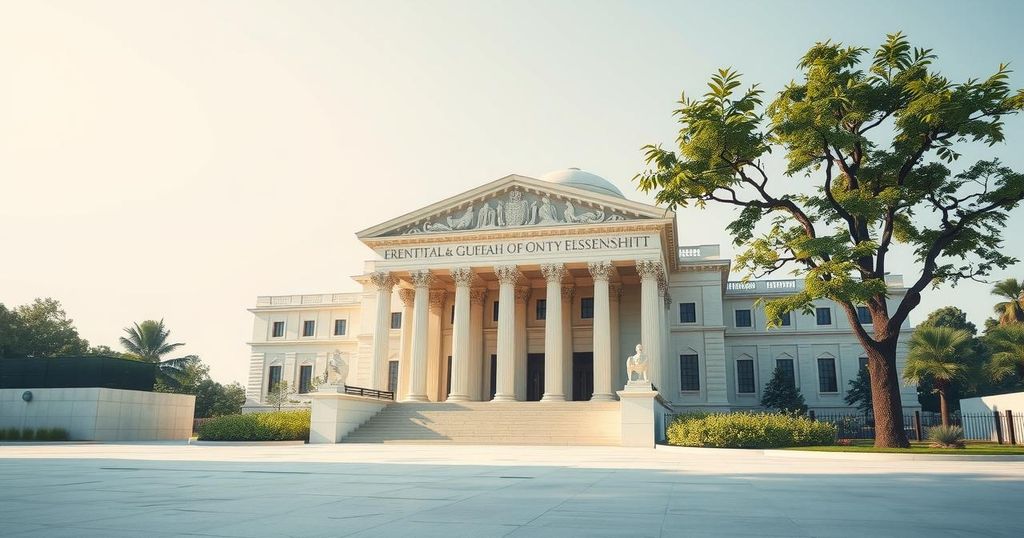Lebanon has announced a new government led by Prime Minister Nawaf Salam, following the resignation of Najib Mikati. The new Cabinet, comprising 24 ministers, aims to implement economic reforms and ensure adherence to UN Resolution 1701 for enhanced security. International support from the UN and EU highlights the critical nature of reform in Lebanon’s future stability and development.
Lebanon’s presidency has officially announced the formation of a new government led by Prime Minister Nawaf Salam. This decision follows President Joseph Aoun’s signing of decrees which accept the resignation of outgoing Prime Minister Najib Mikati and tasked Salam with forming a new, 24-member Cabinet. The first meeting of this new government is set for February 11 at Baabda Palace in Beirut after weeks of political negotiations.
In his inaugural address, Prime Minister Nawaf Salam emphasized that his administration will prioritize essential economic reforms to secure funding for reconstruction and investment in Lebanon following the recent conflict between Israel and Hezbollah. He reiterated Lebanon’s commitment to uphold UN Resolution 1701, which was enacted to cease hostilities between the two parties in 2006.
“Now that the government has been announced, which I hope will be a government of reform and salvation… I would like to emphasize the following points… First, that reform is the only path to real salvation,” stated Salam. He also highlighted the government’s focus on ensuring security and stability in Lebanon through the complete implementation of the aforementioned resolution.
Mahmoud Makieh, the Secretary-General of the Council of Ministers, disclosed the members of the new Cabinet. Key posts include Tarek Mitri as Deputy Prime Minister, Michel Mnassah as Minister of Defence, and Youssef Rajji as Minister of Foreign Affairs. The government consists of 24 ministers, each responsible for various sectors within the nation.
Negotiations to finalize the government faced delays due to disagreements over the appointment of Shiite ministers traditionally aligned with Hezbollah and its ally, the Amal Movement. The agreement and formation of this Cabinet are anticipated to pave the way for renewed political stability in Lebanon.
The United Nations and European Union have both endorsed the new government. Jeanine Hennis-Plasschaert, the UN Special Coordinator for Lebanon, remarked that the new government could lead the country towards a brighter future. Similarly, EU Ambassador Sandra De Waele reaffirmed support for the government’s commitment to necessary reforms, emphasizing their importance to Lebanon’s future.
Lebanon has experienced persistent political instability, exacerbated by economic challenges and conflicts, including those involving Hezbollah and Israel. The recent transition of power from Prime Minister Najib Mikati to Nawaf Salam reflects the ongoing efforts to stabilize governance in the wake of significant social and economic unrest. The formation of this new government arises from intense negotiations aimed at addressing these critical issues, particularly concerning economic reforms and security. UN Resolution 1701 remains a foundational aspect of Lebanon’s political landscape since its implementation after the 2006 conflict, underscoring the importance of maintaining stability through international frameworks. This context is vital for understanding the challenges and expectations surrounding the newly formed government and its approach to governance.
The formation of Lebanon’s new government under Prime Minister Nawaf Salam marks a significant development in the country’s governance. Prioritizing economic reforms and commitment to UN Resolution 1701, the Cabinet aims to address pressing national challenges. Support from international entities like the United Nations and the European Union underscores the perceived importance of this government in facilitating necessary reforms for Lebanon’s future stability and growth.
Original Source: www.dailynewsegypt.com






